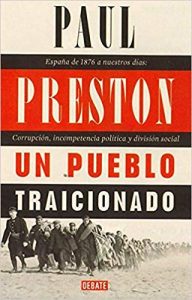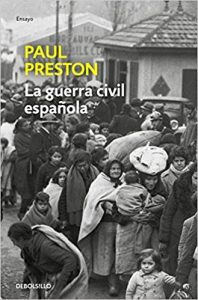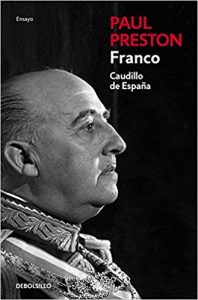As is often said between the jocular and the true, next to the dictionary meaning of Hispanism should appear the face of Paul preston. Because, as a historian (and precisely with greater zeal in this chronistic aspect of the hispanic), this English author has investigated and finally collected and disseminated one of the most extensive works about the significance and meaning of what is Hispanic.
A vital task to treasure that legacy loaded with a great cultural, traditional and linguistic deposit, maintained until today as one of the immaterial riches of the world.
Nobody better than someone outside the beginning, to take care of such a task. Because freed from connotations and tendencies, Preston has been able to provide that target registration point, what a meticulous librarian, to put the dots on the hers and on the commas in everything related to scope and meaning.
So any of his books on different eras supposes an unconditional historical analysis, a desire to disseminate it to leave testimony of everything seen, read and learned.
Top 3 recommended books by Paul Preston
A people betrayed
When Lazarillo de Tormes was written, the idiosyncrasy of Spanish growth, that mixture between the survival instinct and the aspirations of every botarate involved in regidor or politician, had just been sentenced for posterity.
It is not that they were all who were, but among all those who reached power, many of those characters of the guide, recovered for the cause many centuries later with the absurdity of Inclán Valley. An astute observer and highly skilled chronicler like Paul Preston would surely marvel at the deprivation of success of so many ingenious guide-guides in favor of sycophantic chumps who almost always, as in the blackest novels, end up triumphing.
In the extensive bibliography of this English writer, this volume serves as a synthesis or at least as a compilation of relevant intrahistories for an entire XNUMXth century marked to a large extent by dictatorship or corruption and despite this also surpassed in the most remote scenarios of the scene. politics, in the hands of inept on many occasions. Although in the end it follows that it was not simple ineptitude but servility to the elites with which both parties perpetuated themselves in a desperate quid pro quo.
That is the great betrayal, the maintenance of the favors given as a fixed guideline, a devastating custom that turns politicians more than hypocrites into cynics who never looked at social needs beyond the minimum base always conquered by the popular classes. But of course, all this is my own deduction from a more aseptic story that focuses on the facts so that it is the reader who ends up judging and submitting to criticism.
The Spanish Civil War (updated edition)
A review for one of the books that discovered Preston as one of the most intense researchers in our recent history.
The fact of reviewing his own work on black social and political vicissitudes between 36 and 39 was due to new enlightening research on aspects initially addressed in the book. And it is good to be critical of yourself and consider a more complete reissue that broadens the focus of those days in which half Spain fought a fratricidal duel against the other half.
Preston begins with the sinister prolegomena of the conflict, the Republic, always in impossible equilibrium, and the violent outbreaks also on his part. Then we address the outbreak of the War and the various aspects that frame the GCE in a strange world context. Because Franco received help from flanks that would soon confront each other in the WWII, which does not cease to show the self-serving mechanism of international politics cynicism.
Beyond the general context, Preston reviews aspects with surprising detail, addressing particularities of diverse characters and a multitude of events that end up composing a particular sinister universe around the war. An essential book for anyone who wants to know what happened between 1936 and 1939, with its preambles and consequences. Because the book also ends up tackling that legacy between those nostalgic for Francoism and the heirs of Republicanism who did not always know how to vindicate their essence for the final dignity and that so-called Historical Memory always weighed down by complexes and fears.
Franco (updated edition)
In my book «The arms of my cross«, A ucronía on the flight of Hitler to Argentina, I approached the figure of Franco in a chapter. Or more than his figure which made the dictator end up dying peacefully showing off until his last breath.
Neither by image nor by his fluffy speeches could he be considered a character that would devastate his presence, and yet he was there for 40 years. Much had to do with the interests of the moment and the cynical opportunism of the dictator who knew how to weather during the Second World War and after it while continuing with the persecution of internal dissent. The point is that he is undoubtedly an interesting character for a study like the one Preston did on this occasion and on whose avatars he continues to collect more information incorporated in this new volume. What is clear with this new publication is the great weight of ambition to achieve the most abominable goals.
Franco was ambitious for his ego, more than in an imperialist strand that finally headed towards autarky and misery and that sold "his homeland" to the highest bidder to get his cut. A self-conscious admirer of other more powerful dictators, Franco nevertheless knew how to make an underground policy for his own survival as a leader. Paul Preston edited the first book on Franco more than twenty years ago and now masterfully completes it on new research and more complete aspects.




2 comments on "The 3 best books of Paul Preston"